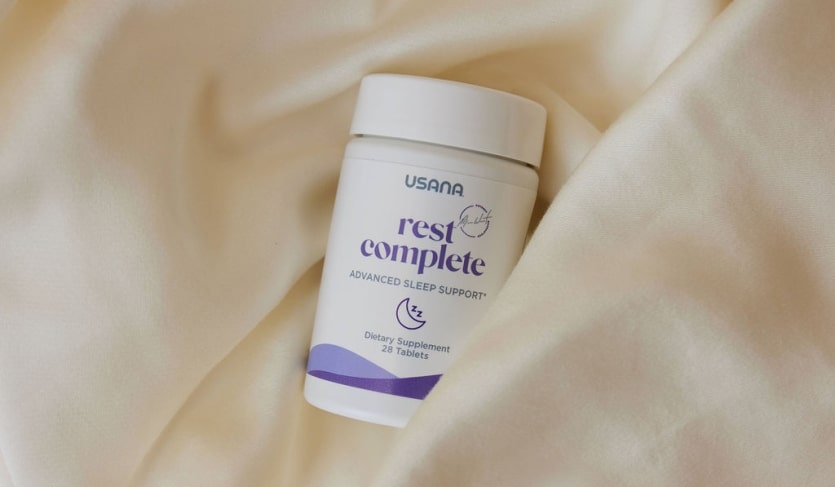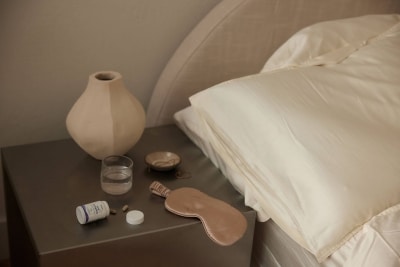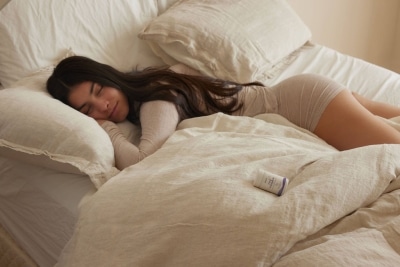USANA 舒壓好眠錠
你在睡覺時間是否輾轉難眠?您感覺大腦和身體還不疲倦嗎?如果您有這種感覺,您並不孤單。有時候您的神經系統需要幫忙接收訊息,知道已經晚上了、明日會是忙碌的一天,而且現在是睡覺時間。
USANA 舒壓好眠錠是一款全面性睡眠補充品,能夠幫助您的身體和大腦準備入睡。睡前一小時服用舒壓好眠錠可放鬆肌肉、減少焦慮並促進安穩的睡眠。*
舒壓好眠錠含有:
睡眠對於身體和大腦的修復至關重要,幫助您在生活中充滿活力並保持靈敏。睡眠能夠支持大腦功能,如專注力、清晰思維和記憶處理。也有助於調節情緒、支持管理壓力的能力、鞏固學習記憶,並改善決策和解決問題的能力。
睡眠對您的身體健康也十分重要。良好的睡眠有助於所有肌肉、組織和各個細胞的癒合和修復。此外,睡眠能夠支持免疫系統抵抗感染。睡眠也會影響控制食慾的賀爾蒙,進而影響體重。其實,睡眠對我們的生存與食物和水一樣重要。它影響著您體內所有的組織和系統。
但是,若沒有良好的睡眠,便無法獲得這些健康益處。有許多原因可能會導致您難以入眠或一覺到天亮。
外在因素如熬夜看電視或手機,可能會在熄燈數小時內擾亂您的睡眠。腦中對家庭、工作、財務的想法和擔憂,甚至對睡眠本身的擔憂也會使您難以平靜下來並得到休息。
褪黑激素有助於支持您的天然睡眠週期
褪黑激素是一種在啟動睡眠中扮演重要角色的賀爾蒙。它在大腦的松果體中合成。其主要功能為調節體內的睡眠清醒週期。基本上,它幫助您的身體與太陽的 24 小時週期保持同步。
褪黑激素不會在白天生成。隨著日光的減弱和夜晚的臨近,褪黑激素的生成會隨之增加。夜晚到來時,提升的褪黑激素水平會提醒您的身體現在是休息時間。
在現代生活,夜晚時我們經常被暴露在人造光源中。人造光源來自電視、手機螢幕或家中的燈光。這種燈光會抑制褪黑激素生成且可能會擾亂您的自然晝夜節律——身體的生理時鐘。當自然晝夜節律被擾亂,可能會造成您難以放鬆入睡並一夜好眠。
嘗試服用舒壓好眠錠來維持整晚的褪黑激素水平。舒壓好眠錠旨在幫助您的身體作息與地球上光明與黑暗的自然循環保持一致,培養更加天然的睡眠節律。在睡前約一小時服用舒壓好眠錠有助於降低清醒、產生睏意並享受沈穩的睡眠。
褪黑激素也有其它功能。擔心睡眠不足會打亂假期或導致出差期間疲勞的人來說,褪黑激素是理想的旅行夥伴。眾所皆知,它對跨越多個時區旅行時可以幫助緩解時差反應。褪黑激素能夠幫助您的身體和大腦與旅行目的地的 24 小時晝夜週期調整同步。
除了幫助睡眠,褪黑激素也有助於細胞健康。它具有抗氧化成分的功能,能夠清除自由基並支持體內的內源性抗氧化酶。透過對抗損傷細胞的氧化壓力,褪黑激素不只支持睡眠,也能在睡眠期間提升體內的修復活動。
舒壓好眠錠幫助您感到平靜並放鬆心情
燈光可能不是唯一一個使您難以入眠的原因。當生活總是忙得不可開交,您很難在該睡覺的時候靜下心來。舒壓好眠錠全面性地幫助您一夜好眠、幫助您辨認各種不同可能使您夜晚無法入睡的原因。
舒壓好眠錠中的南非醉茄含有許多健康益處。舒壓好眠錠中含有這種強效藥草,因為它能夠幫助調節皮質醇和神經遞質水平,有助於平衡壓力反應。*
南非醉茄的功能是調節身體的壓力機制,在不造成任何不良影響的情況下模擬輕度壓力的影響。這個過程有效地提升您身體的適應力,使您在各種壓力中(身體、心理或環境),都能保持平靜。
南非醉茄提供其它益處如抗氧化特性、生理和心理益處。它以使人感到寧靜並提供持久的認知功能而聞名。這兩項益處的結合有助於幫助您放鬆大腦,進而享有安穩的睡眠。
舒壓好眠錠幫助您平靜神經和肌肉
舒壓好眠錠含有 GABA(γ-氨基丁酸)——它是一種神經遞質,可通過關閉清醒功能和安定神經活動來幫助平靜大腦和身體。它也含有 L-茶氨酸(是一種氨基酸),能夠通知您的身體製造更多的 GABA,有助於整晚保持體內已提升的 GABA 水平。
GABA 是一種胺基酸神經傳導物質,它有助於促進神經元之間的交流。值得注意的是,GABA 作為抑制性神經傳導物質,能夠阻擋某些訊息傳輸並減慢其它神經通訊的速度。
使用 GABA 的神經元組合被稱為 GABAergic 系統,可作為類似煞車踏板的調節機制。它有助於減緩資訊的傳遞、減少其它神經傳導物質的活動,並降低大腦神經興奮。
感到壓力、焦慮或恐懼經常與過量的神經元活動和刺激有關。GABA 以促進放鬆和平靜而聞名,這與其抵銷過量的神經元活動的能力有關。
在睡眠調節的領域,GABA 扮演著關鍵的角色。每當到了休息時間,GABAergic 系統會強化其功能,舒緩神經系統並帶來平靜。這個過程有助於從清醒狀態轉變到睡眠初期及後續階段。褪黑激素等賀爾蒙針對 GABA 受器,進一步增強 GABAergic 系統的鎮靜作用。
使用方法
成人睡前一小時依需求服用一(1)錠以緩解偶爾失眠。
適合
- 偶而失眠
- 夜間工作
- 調整時差之人
參考文獻
https://www.nigms.nih.gov/education/pages/Factsheet_CircadianRhythms.aspx
Han KS, Kim L, Shim I. 2012. Stress and sleep disorder. Exp Neurobiol 21(4): 141-150.
Czeisler CA. 2013. Perspective: casting light on sleep deficiency. Nature 497(7450): S13.
Xie Z, et al. 2017. A review of sleep disorders and melatonin. Neurol Res 39(6): 559-565.
https://www.ncbi.nlm.nih.gov/books/NBK19961/
Copinshi G. 2005. Metabolic and endocrine effects of sleep deprivation.
Ess Psycopharm 6(6): 341-7. {also MEMORY}
Watson, AM. 2017. Sleep and athletic performance. Curr Sports Med Rep 16(6): 413-418.
National Sleep Foundation. What Happens When You Sleep?
Mayo Clinic. Is melatonin a helpful sleep aid – and what should I know about melatonin side effects?
這些聲明未經過「食品藥品管理局 (Food and Drug Administration)」的鑑定。本產品無法用於診斷、治療、治癒或預防任何疾病。







